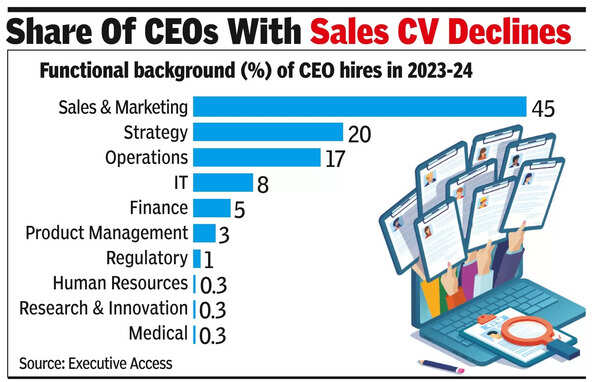NEW DELHI: With rapid technological advancements, global economic shifts and changing consumer behaviour, the status quo is continuously being challenged. C-suite executives are evolving and adapting their qualifications to align with ever-changing
business
landscape and to keep pace with an increasingly brittle, anxious, non-linear, incomprehensible environment.
So, traditional qualifications like
sales
and
marketing
expertise may no longer be sufficient. Leaders now need a broader and more diverse set of skills, including
strategy
, to succeed in a fast-changing world. A survey conducted across sectors by global search firm Executive Access, commissioned by TOI mirrors the trend.

The study of over 300 new CEO hires in 2023-24 says the percentage of C-suite leaders from sales and marketing stream is 45%, A drastic drop by nearly half the number that it used to be. Over a decade back,
CEOs
were predominantly from the sales and marketing background, with about 80% belonging to that stream. And, streams like strategy and
operations
are fast catching up. The survey shows around 20% of CEOs come from strategy, a new trend and reflects how times have changed (see graphic).
"A lesser percentage of CEOs come from the function of sales and marketing, which was not the case earlier. The survey also found a higher number of CEOs are now from strategy and operations. Strategy has become very important as complexity and uncertainty of any business has increased significantly. Also, shelf life of any product or idea has come down significantly. Businesses are looking to survive and grow as businesses are becoming extinct much faster today, with more companies ceasing to exist than ever before. Therefore, it has become imperative for companies to look at both survival and growth, which a strategist can do well," Executive Access India MD Ronesh Puri said.
The shift over the last decade is due to increased business complexities, industry experts say.
"In a world where winning was all about outwitting the competition through better sales and marketing and better revenue generation, CEOs were largely chosen from the sales and marketing function. One could witness that typically in FMCG companies. But, there has been a shift in the last decade or two. Now, CEOs have to deal with investors, regulatory bodies, banks, environmental frameworks, global economic situations and so on. Second, technology, logistics, supply chain have become major drivers of success. In more uncertain and unstructured environments, strategy specialists are well-suited. Moreover, many of the strategy specialists come with a great IIT-IIM background and a stint in a global consulting firm. This pedigree and experience of working through diverse industries make them a good choice for CEOs," said Harsh Goenka, chairman, RPG Enterprises:
"A strategist is chosen to navigate mega changes, such as those caused by AI," former HCL CEO Vineet Nayar said. "The current trend indicates that most industries and companies are focusing on transformation to stay relevant. More and more companies are seeking leaders with strategic outlook, who can redraft strategies and guide them back to a growth trajectory," he added.
Adoption of AI is accelerating across various industries. It is becoming an increasingly essential tool for businesses to stay competitive in today's digital age.
Further, there is a growing realisation that effective CEOs are those, who have the ability to look at multiplicity of variables. "More importantly, he/she should be able to make holistic and effective decisions. This is no longer a monopoly of any particular line of function - sales/marketing or manufacturing. Effective CEOs need to be far more well-rounded, strategic, agile, futuristic, and forward-looking...Those coming from the strategy domain are seen to have an edge, Prem Singh, president - group HR, JK Organisation & president, National HRD Network, said.












 English (US) ·
English (US) ·